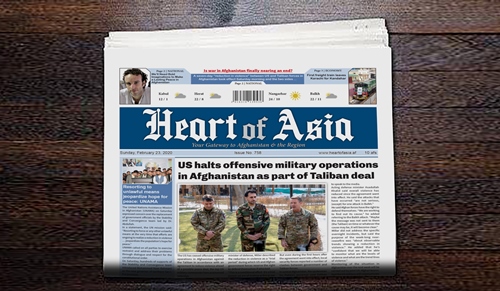The US has ceased offensive military operations in Afghanistan against the Taliban in accordance with an agreement to reduce violence ahead of a possible peace deal, the top US military commander here announced Saturday.
Gen. Austin “Scott” Miller told reporters in Kabul “our operations are defensive at this point, we stopped our offensive operations as part of our obligations, but we remain committed to defend our forces.”
Standing beside the Afghan acting minister of interior and acting minister of defense, Miller described the reduction in violence as a “trial period” during which US and Afghan government forces reserve the right to defend themselves if attacked.
“This is a conditional effort. It’s a trial period, we are all looking at this to see that all sides are able to meet their obligations,” he said.
The reduction in violence officially began early Saturday morning just after midnight and is set to last a week. If it holds the United States and the Taliban have said they will sign a peace deal at the end of the month.
But even during the first hours after the agreement went into effect, local security forces reported a number of clashes between government and Taliban forces.
In central Afghanistan, the spokesman for Paktia’s governor said Taliban attacks on government outposts lasted for over an hour after the violence reduction went into effect. And in the north, a security official in Balkh reported coordinated Taliban attacks on government outposts. The official spoke on the condition of anonymity as he was not authorized to speak to the media.
Acting defense minister Asadullah Khalid said overall violence has reduced since the agreement went into effect. He said the attacks that have occurred “are not serious, (except) for one attack in Balkh.”
He said Afghan forces have the right to defend themselves. “We are working to find out its cause,” he added referring to the Balkh attack. “Maybe the message was not sent to them (the Taliban) on time or whatever the cause may be, it will become clear.”
Miller did not address the specific overnight incidents, but said the purpose of the week-long near-ceasefire was “about observable trends showing a reduction in violence.” He added that he’s “confident that we will be able to monitor what are the levels of violence and what are the trend lines of violence.”
Monitoring of the situation in Afghanistan over the next week will be carried out by joint US-Afghan teams. And the US military will communicate with the Taliban “through a military communications channel in Doha,” to determine the causes and perpetrators of attacks.
The peace deal that US and Taliban negotiators have committed to sign should the reduced violence hold will begin the withdrawal of thousands of US troops. In exchange, the Taliban pledge to begin intra-Afghan talks and to not harbor terrorists with the intent to attack the West.
All of these very sensitive security agreements are going into effect against the backdrop of a deepening political crisis in Afghanistan. Following disputed election results, Afghan President Ashraf Ghani’s main rival has threatened to forcefully replace governors in the country’s north as part of his efforts to form a political government.
These divisions have the potential to upset the cohesion of armed groups allied with the Afghan government that fall outside the formal military’s structure. And political disunity, should it persist, could undermine Ghani’s efforts to form a strong, inclusive negotiating team to enter into intra-Afghan talks with the Taliban.











